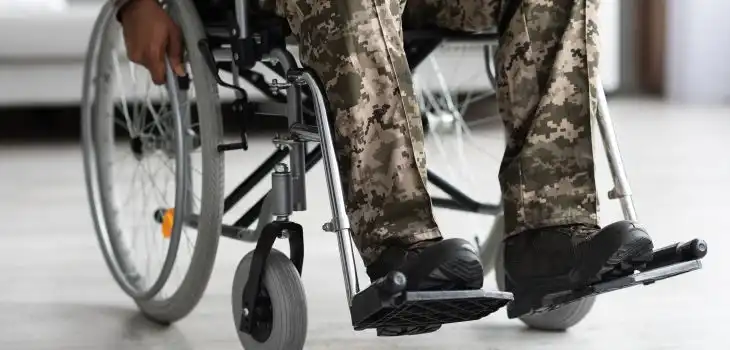Table of Contents
Understanding Wounded Warrior Social Security Disability
We owe our wounded warriors. They’ve put everything on the line for millions of fellow countrymen and women. In war and in battle, wounded warriors have sacrificed. They’ve taken tremendous risks. They’ve suffered tremendous trauma. They’ve paid costs few people can understand.
Unfortunately, many wounded veterans will never be the same. They may be disabled for life. They may struggle with the most basic daily activities. They may feel depressed, hopeless, and incapable. Disabled veterans often experience a lower quality of life than do their non-disabled counterparts.
The families and loved ones of wounded warriors are burdened as well.
This is why the Social Security Administration (SSA) offers assistance. The SSA administers many monthly benefits payments that can significantly improve the lives of wounded warriors.
Social Security Wounded Warrior Benefits
The Social Security Administration (SSA) recognizes the sacrifices that wounded warriors have made. The SSA also recognizes the severity of warriors’ wounds. For these reasons, the agency offers expedited processing. This faster decision-making allows qualifying military servicemen and women to more quickly receive the benefits they need.
The SSA approves a warrior’s application for expediting based on specific dates.
The expedited determination process applies only to military service members who became disabled during active military service. This disability must have started on or after October 1, 2001.
The SSA does not discriminate based on where the disability began. This way, all wounded warriors serving across the world can be assisted.
Wounded warriors should recognize that an application for disability benefits is different than an application for benefits under the Department of Veterans Affairs (VA).
When applying to the SSA and VA, service members must file two separate applications.
Under the SSA, military servicemen and servicewomen can apply to two programs. These programs administer disability benefits for recipients who are disabled and in need. The first program is Social Security Disability Insurance (SSDI) and the second program is Supplemental Security Income (SSI).
The SSDI program delivers benefits to applicants and family members if the applicants are “insured.” An applicant demonstrates this insured status by proving a sufficient work history. A worker can receive four work credits for every year worked. Work credits are based on the amount of money earned in that period.
A recipient of SSDI benefits has paid into Social Security through taxes as well.
Meanwhile, the Supplemental Security Income (SSI) program is different. This social assistance program delivers benefits based on financial need. An applicant must demonstrate limited resources and income to qualify.
The SSI program does not require a history of work credits. Applicants do not have to be “insured.” Instead, applicants for SSI benefits are generally:
-
- Elderly, blind, and disabled
- Of limited income and assets; and
- In need of cash to obtain necessities such as food, clothing, and shelter
In both programs, the Social Security Administration (SSA) relies on a strict definition of disability. The disabling condition(s) must meet certain criteria for duration and severity. The condition(s) must also prevent the applicant from working in any significant capacity. The disability should be total disability.
Partial and short-term disabilities are not covered by the SSA.
How The SSA Defines Disability
Every applicant must demonstrate that the condition(s) cannot be easily overcome. The condition(s) must meet a medical criteria. If the applicant’s impairments do not meet a listed disability under the SSA, the applicant will have to further prove the severity of impairment.
Although some programs give money to wounded warriors with partial disabilities or short-term disabilities, Social Security does not.That said, Social Security still provides benefits to wounded warriors receiving military pay. Wounded warriors can still receive disability benefits, even when on active duty and receiving military payments.
Wounded warriors receiving treatment at military medical facilities may also be eligible for social security benefits. If a military service member is on limited duty, the Social Security Administration may still provide benefits.The SSA makes evaluations based on wounded warriors’ work activities and capacities. One’s military pay and duty status are of less significance.
Generally, the medical conditions:
- Must prevent the worker from engaging in a substantial gainful activity (SGA); and
- Must have lasted, or continue to last, at least one year; or
- Must be expected to lead to death.
Disability Benefits For Wounded Military Servicemen & Women
Wounded warriors have a number of options when applying for benefits. In some cases, servicemen and women can even receive disability benefits for past disabilities that have improved. If the wounded warrior qualifies for a “closed period of disability,” he or she may receive benefits.
The criteria for a closed period of disability include disability duration and severity.
To qualify for a past disability, a wounded warrior must:
- Provide medical evidence that establishes an inability to engage in substantial gainful activity for a continuous period of one year; and
- Demonstrate that, at the point the disability determination is made, the SSA no longer finds the service member disabled; and
- File an application within 14 months of the disability ending,
The SSA also offers retroactive payments for these disability benefits. A wounded warrior may receive as many as 12 months of retroactive benefit payments from the date of application filing.
Service members on active duty can also receive Social Security disability benefits. These warriors should inform the Social Security Administration (SSA) of any changes in military codes and classifications, including changes in:
- Military Occupational Specialty code (MOS);
- Air Force Specialty Codes (AFSC); or
- Navy Enlisted Classification (NEC)
At times, the application process can be very difficult. Many wounded warriors may struggle to prove disability. Other service members will encounter trouble in qualifying based on previous determinations and classifications. When a wounded warrior seeks benefits for family members, the process can become even harder.Wounded warriors should consult the top disability attorneys for help. A sound legal professional can ensure that disabled service members receive the benefits they deserve.
